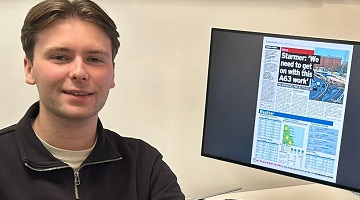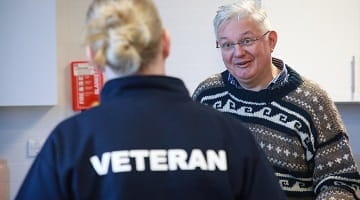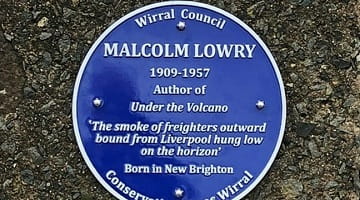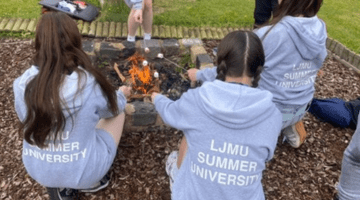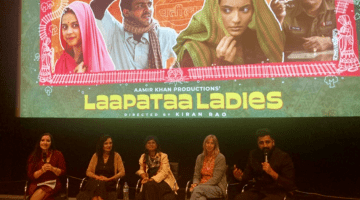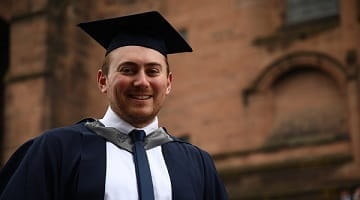Why study this course with LJMU?
- Extensive range of texts studied, from Milton, Woolf and Dickens to Margaret Atwood, Kazuo Ishiguro and Arundhati Roy
- Taught by leading scholars who have published books on many topics, from Sherlock Holmes to Irish rock music and teenage bedroom culture
- Large range of option modules to choose from depending on your interests
- Work placement opportunities in Britain and overseas in teaching, public relations, international development, charities, tourism, the media, creative and heritage sectors
- 97% of students surveyed said academic support on our English courses was good or very good (National Student Survey 2024)
- 95% of students surveyed said the teaching staff on our media courses were good at explaining things (National Student Survey 2024)
- LJMU ranked 18th university in the UK for English (The Times UK University Rankings 2025)
About your course
The BA (Hons) English, Media and Cultural Studies at Liverpool John Moores University gives you an opportunity to look at how literary and media texts address their audiences. Through gathering expertise in critical appraisal, analysis of case studies and independent study, students learn to communicate effectively in interpersonal, formal and digital environments.
You will achieve this through the study of media institutions, publishing and journalism, as well as forms of applied communication in practical areas including, public relations, social marketing, fiction, documentary, video games, magazines and new media. You will also examine cultural trends and practices, including popular music, youth culture, world literature, neo-Victorianism, social media, travel, and fashion. Your study of literature will be defined by an eclectic choice of texts, from the classics to popular fiction.
We are interested in traditional authors such as William Blake, Charles Dickens and Virginia Woolf and in contemporary writers such as Margaret Atwood, Kazuo Ishiguro and Arundhati Roy. Alongside British literature we study American literature and culture and Irish, postcolonial and world writing.
We introduce you to many different types of text such as detective novels, children's fiction, fairy tales, ballads, prison testimonies, African American slave narratives, travel writing, protest literature, diaries and letters. Our diverse portfolio of options lets you explore new topics and choose your own pathway through the degree as your interests develop.
The programme is designed with your future employability in mind, so you are encouraged to develop transferable skills such as research, formats for professional writing, communication, problem solving, teamwork and independent working.
Some modules ask you to engage in collaborative blogging, contributing to online archives and improving your digital skills. Although we focus on theoretical and critical study, we incorporate applied case studies and work-related learning into many aspects of the programme, including a period of work experience with a local or national organisation.
Course modules
What you will study on this degree
Further guidance on modules
Modules are designated core or optional in accordance with professional body requirements, as applicable, and LJMU’s Academic Framework Regulations. Whilst you are required to study core modules, optional modules provide you with an element of choice. Their availability may vary and will be subject to meeting minimum student numbers.
Where changes to modules are necessary these will be communicated as appropriate.
Core modules
Core modules
Optional modules
Optional modules
Professional accreditation
This course has strong links with local, national and international media organisations providing excellent opportunities for student work placements and research projects. They include: Sky Sports, Liverpool Echo, Juice FM, Odeon Cinema, Everyman Theatre, The Royal Court, National Museums and Galleries on Merseyside, TATE Liverpool and the BBC.
Your Learning Experience
Excellent facilities and learning resources
We adopt an active blended learning approach, meaning you will experience a combination of face-to-face and online learning during your time at LJMU. This enables you to experience a rich and diverse learning experience and engage fully with your studies. Our approach ensures that you can easily access support from your personal tutor, either by meeting them on-campus or via a video call to suit your needs.
Teaching is delivered via lectures, seminars, workshops, online activities, peer presentations and film screenings and fieldwork trips (for example, to Copenhagen) and you are expected to spend a significant proportion of your time in private study, using our virtual learning environment, as well as our archives and special collections. Online discussion boards allow you to further debate, with your tutors and peers, ideas that arise in the classroom.
Work-related Learning
The programme is designed with your future employability in mind, so you are encouraged to develop transferable skills such as research, formats for professional writing, communication, problem solving, teamwork and independent working.
Some modules ask you to engage in collaborative blogging, contributing to online archives and improving your digital skills. Although we focus on theoretical and critical study, we incorporate applied case studies and work-related learning into many aspects of the programme, including a period of work experience with a local or national organisation.
We offer a range of different options in English and further opportunities in Media and Cultural Studies for work-based and work-related learning. For instance, if you choose the Working in the USA module, you will have the opportunity to spend a month or more in the United States at the end of your second year.
Past students have worked for the editor of Vogue, an advertising agency in New York, a National Park in the Appalachian Mountains, an architect's office in California and theme parks in Florida.
Dedicated personal tutor, plus study skills support
If you study English, Media and Cultural Studies at LJMU, you will join a friendly and stimulating environment in which you will be encouraged to achieve your full potential in both your academic work and your future career. We pride ourselves on our informal and supportive relationship with our students.
You will be assigned a personal tutor who will be responsible for your academic and personal progress throughout the course. Along with this scheduled one-to-one support, you will receive regular feedback and guidance from your module tutors on your research, writing and study skills.
Assessment varies depending on the modules you choose, but will usually include a combination of exams and coursework.
We believe that all students perform differently depending on how they are assessed, which is why we use a combination of assessment methods. In fact this course has received national recognition for its innovative assessment methods. They include exams (seen and unseen), essays, log books and diaries, group and individual presentations, research projects, response papers, blogs, organised debates and seminars.
Throughout your course you will be given regular constructive feedback and have opportunities to discuss this with your personal tutor and course lecturers. This is particularly useful in helping you to identify your strengths as well as the areas where you may need to put in more work.
Where you will study
What you can expect from your School
The School of Humanities and Social Science offers an ideal environment in which to expand your knowledge and horizons. Situated on Mount Pleasant in the new ‘Knowledge Quarter ' of Liverpool, the School is home to five subject areas: English, History, International Relations, Sociology, and Media, Culture & Communication. It has a lively programme of cross-disciplinary research seminars, conferences, visits from international scholars and public events. Research from the School is recognised nationally and worldwide.
Course tutors

Dr James Whitehead
- Programme Leader
The English Literature programmes at LJMU integrate the study of the authors, texts, and periods you'd expect in high-quality courses with dynamic new approaches including eco-criticism and the study of world literature. Our friendly team of expert teaching staff are research-active and are keen to help our students in their next steps.'
The English Literature programmes at LJMU integrate the study of the authors, texts, and periods you'd expect in high-quality courses with dynamic new approaches including eco-criticism and the study of world literature. Our friendly team of expert teaching staff are research-active and are keen to help our students in their next steps.'
I am currently Programme Leader for English and am happy to field any questions about our degree programme from current or prospective students. My research and teaching interests include Romanticism and its legacies, psychiatry and other psy-sciences in relation to nineteenth and twentieth-century literature, and life-writing (autobiography and biography) about mental health and illness. My core undergraduate teaching includes 5111ENGL Romanticism and 5108ENGL Poetry Matters. I am also very happy to discuss postgraduate study and research plans in these areas.


I didn't know what I wanted to do when I started University, people kept asking me but I just wanted to study. In the third year I had done so many things I was ready to start applying for communications jobs and found the role that was right for me.
Career paths
The career paths followed by our graduates are varied in nature.
Alumni can be found working in advertising, marketing, public relations, museums, arts administration, media production, the publishing industry, retail, leisure and charitable organization management, educational administration, accountancy, the social services, teaching and the Civil Service.
Student Futures - Careers, Employability and Enterprise Service
A wide range of opportunities and support is available to you, within and beyond your course, to ensure our students experience a transformation in their career trajectory. Every undergraduate curriculum includes Future Focus during Level 4, an e-learning resource and workshop designed to help you to develop your talents, passion and purpose.
Every student has access to Careers Zone 24/7, LJMU's suite of online Apps, resources and jobs board via the LJMU Student Futures website.
Tuition fees and funding
- Home full-time per year:
- £9,535
The University reserves the right to increase tuition fees in accordance with any changes to the maximum allowable fees set by the UK Parliament. In the event of such a change, any fee increase will be subject to a maximum cap of 10% of the total course cost as originally stated at the time of your offer.
The fees quoted above cover registration, tuition, supervision, assessment and examinations as well as:
- library membership with access to printed, multimedia and digital resources
- access to programme-appropriate software
- library and student IT support
- free on-campus wifi via eduroam
Additional costs
Although not all of the following are compulsory/relevant, you should keep in mind the costs of:
- accommodation and living expenditure
- books (should you wish to have your own copies)
- printing, photocopying and stationery
- PC/laptop (should you prefer to purchase your own for independent study and online learning activities)
- mobile phone/tablet (to access online services)
- field trips (travel and activity costs)
- placements (travel expenses and living costs)
- student visas (international students only)
- study abroad opportunities (travel costs, accommodation, visas and immunisations)
- academic conferences (travel costs)
- professional-body membership
- graduation (gown hire etc)
Funding
There are many ways to fund study for home and international students. From loans to International Scholarships and subject-specific funding, you'll find all of the information you need on our specialist funding pages.
Entry requirements
Please choose your qualifications below to view requirements
Grades/points required from qualifications: BCC-BBB (104-120)
Work out how many UCAS points your qualifications are worth by visiting the UCAS Tariff Calculator.
Qualification requirements
How to apply
Securing your place at LJMU
UCAS is the official application route for our full-time undergraduate courses. Further information on the UCAS application process can be found here https://www.ljmu.ac.uk/study/undergraduate-students/how-to-apply.
All applicants should possess a real enthusiasm for literature and for finding out about the societies and ideas that produce and infuse it.
We'll be looking for evidence that you've read widely outside your set-texts, and are interested in writing in a range of different eras, mediums and cultures.
You'll have the ability to express your own ideas and opinions in a clear and lively way, as well as the desire to listen to and learn from other peoples' views, which may be very different from your own.
You'll have great analytical skills, so that you can critically assess all kinds of forms of communication, including adverts, films, website, television, print-media and literature.
We'll also expect confident research and IT skills, so that your work is well-informed and well-presented.
Your university life
From accommodation and academic support to clubs and societies. Find out what LJMU has to offer.
Related Links
Talk to our students
Connect with a current LJMU student for advice and guidance on university life, courses and more.
See what our students are saying
At LJMU we want you to know you're making the right choice by studying with us. You can see what our students are saying about their experience with us through their reviews on the following websites:
Related Links
News and views
Browse through the latest news and stories from the university
The university reserves the right to withdraw or make alterations to a course and facilities if necessary; this may be because such changes are deemed to be beneficial to students, are minor in nature and unlikely to impact negatively upon students or become necessary due to circumstances beyond the control of the university. Where this does happen, the university operates a policy of consultation, advice and support to all enrolled students affected by the proposed change to their course or module.
Further information on the terms and conditions of any offer made, our admissions policy and the complaints and appeals process.



























